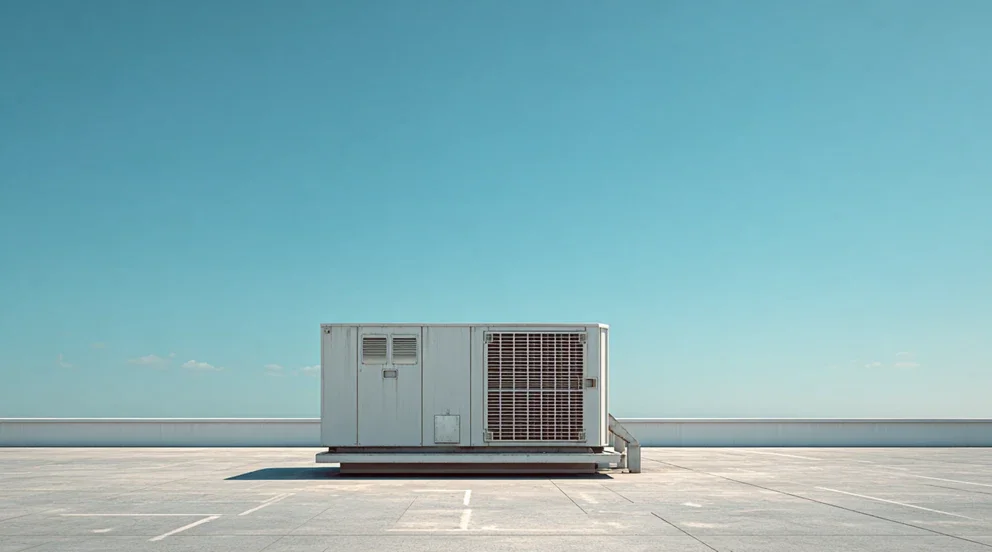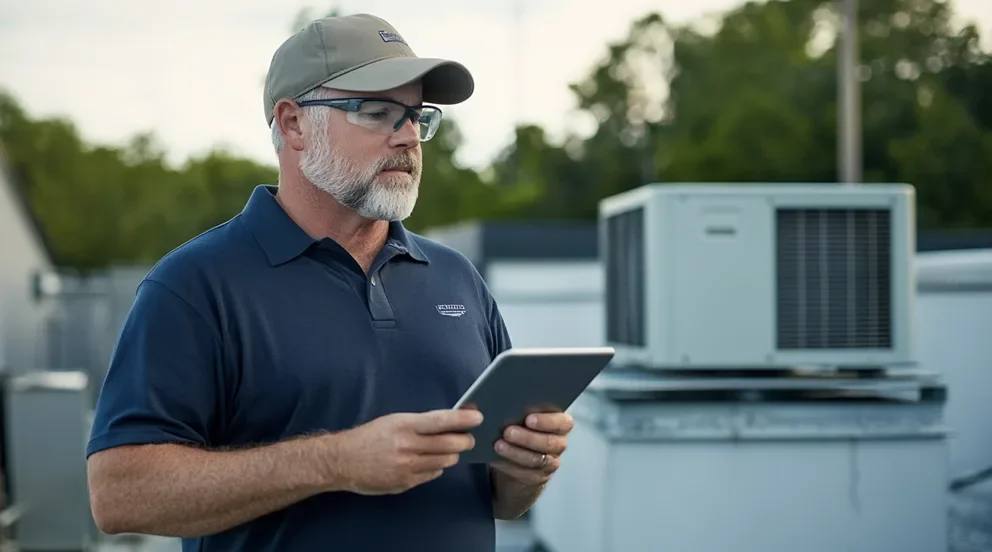Let’s face it: bidding for HVAC jobs can feel like a juggling act. You’re not just competing on price—you’re proving your worth, showcasing your expertise, and trying to convince potential clients that you’re the best choice. Whether you’re competing for commercial HVAC bids, diving into residential, or navigating partnerships with general contractors, the key is mastering the HVAC bidding process.
In this guide, we’ll cover everything from crafting killer proposals to using the right tools to streamline your process. Let’s get you more wins with less stress by explaining:
- Steps in the HVAC bidding process
- How to bid on HVAC jobs: 5 strategies to win more bids
- Differences of bidding for residential vs. commercial vs. general contracting HVAC jobs
- Top 5 HVAC bid templates to use for your next bid
- Top 3 HVAC bidding software & tools for residential and commercial
- Utilizing bidding sites & platforms to submit HVAC bids
Steps in the HVAC bidding process
The HVAC bidding process is the foundation of securing profitable projects. It’s not just about submitting the lowest bid—it’s about crafting a proposal that showcases your expertise, aligns with client needs, and highlights your value. By breaking the process into clear steps, you ensure your bids are accurate, professional, and compelling enough to win the job.
- Understand the Project Scope - Don’t rush in without the details. Understanding client needs—like the differences between a new construction HVAC bid or regular HVAC maintenance bids can help your proposal stand out and be less generic. Look at timelines, certifications, and any specific requirements, and make sure your proposal incorporates these elements that focus on the details.
- Estimate Costs with Accuracy - Accuracy is essential to winning bids, because missing line items can cost you big time, and overestimating your service costs can lose you a lot of potential business. Use an HVAC bid sheet template to estimate labor, materials, overhead, and your profit margins.
- Build a Polished Proposal - Your bid should do more than list prices. Use a professional HVAC bid template to outline the scope, timeline, and pricing clearly. This makes your proposal easier to understand and way more professional.
- Submit Your Bid on Time - Double-check the deadline and the format. Proposals that are late or incorrectly formatted rarely make it past the first cut.
- Follow Up with Confidence - Once you’ve submitted your bid, don’t disappear. A quick follow-up can make a world of difference, especially if you’re ready to answer any questions or clarify details.
You're putting yourself in a position to bid more effectively and win more by breaking down the procedure into these steps. But submitting a strong bid is only half the battle—what really sets you apart is how you refine your proposals and bidding strategy. Up next, we’ll cover actionable strategies to elevate your proposals, stand out from the competition, and secure more wins.
How to bid on HVAC jobs: 5 strategies to win more bids
Every bid you submit is a chance to show why you’re the right team for the job. From nailing your costs to crafting proposals that speak to your client’s needs, a well-thought-out strategy makes all the difference. In this section, we’ll walk you through five proven ways to make your bids stand out, connect with clients, and win more work—without overcomplicating the process.
1. Highlight what makes you different
Price matters, but so does value. Do you specialize in energy-efficient systems? Have you nailed down a reputation for reliability? Highlight those strengths. Testimonials or examples from past projects (especially for bidding HVAC projects) can give you an edge.
Pro tip: Leverage tools like BuildOps to showcase your expertise effortlessly. With features like client history tracking, project notes, and real-time updates, you can pull up previous job details, client preferences, and completed projects in seconds. This makes it easy to tailor your bids with specific examples, highlight your strengths, and build proposals that stand out.
2. Nail your numbers with precision
Accurate estimates can make or break your bid. Tools like HVAC bid sheet templates or software built for HVAC job bids help ensure you’re covering all your costs without overbidding. Look for software that helps you track parts, labor, and overhead easily, giving you confidence that your bid numbers are spot on.
You should also utilize a dashboard for your bids and lead generation that help you track where you’re finding success, and where you went wrong, so you can leverage those takeaways into future proposals.
3. Be strategic about the jobs you target
Focus on bids that align with your team’s strengths and expertise—whether that’s residential installs, recurring maintenance contracts, or large-scale commercial projects. By prioritizing high-value opportunities, you’ll avoid stretching your resources too thin and boost your profitability.
Using tools that help you track and filter potential jobs can make this process easier, giving you a clear picture of where to focus your time and energy for the best results.
4. Make your proposals shine
First impressions matter, especially when clients are comparing multiple bids. A polished, professional proposal that’s clear and visually appealing can set you apart from the competition. Including visuals, timelines, and easy-to-understand cost breakdowns adds a layer of professionalism that builds trust. The right templates can help you pull everything together into a sleek, client-ready document without extra hassle.
5. Build lasting relationships
Winning bids isn’t always about the job—it’s about trust. Follow up personally and stay on your client’s radar for future opportunities. People like working with contractors they know will deliver, and a personal touch in follow-ups or tailored proposals shows that you value the relationship, not just the project. Keep track of your interactions and client preferences with tools designed to organize customer information, so you’re always a step ahead when the next bid comes around.
More than simply offering the lowest price, winning bids involves establishing credibility, showcasing your worth, and projecting a professional image. With these tactics and a little assistance from contractor-specific resources, you'll be prepared to confidently take on your next bid.
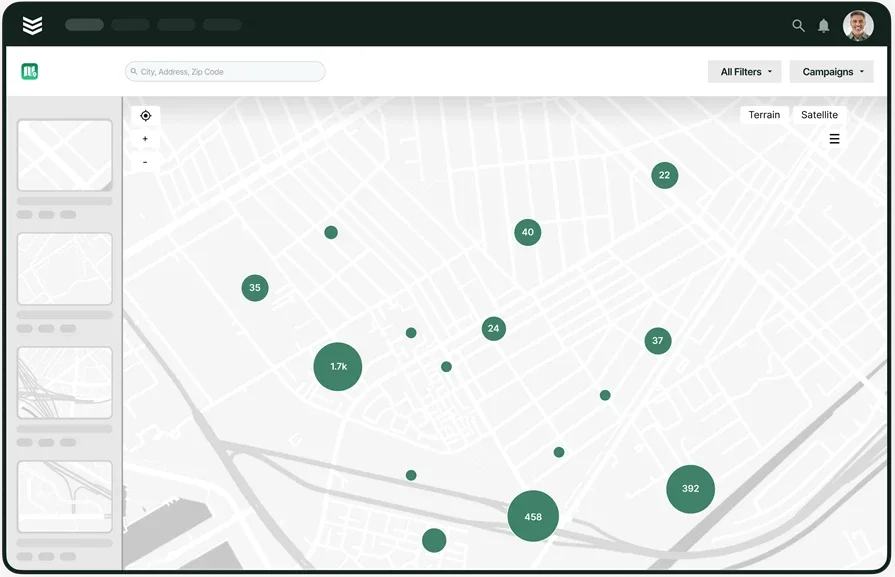
Book more HVAC jobs
Manage jobs from the first quote to closeout—all from a single platform.
Differences of bidding for residential vs commercial vs general contracting HVAC jobs
Securing HVAC bids is about knowing your customer and tailoring your approach to their needs. Whether you're aiming to close high-value commercial deals, high-volume residential jobs, or establish strong partnerships with general contractors, understanding the nuances of each type is crucial. Every type of bid is different. Here's how to approach each category strategically:
Closing higher-value deals by mastering commercial HVAC bids
Commercial HVAC projects are the big leagues. These jobs often involve complex systems, multi-phase installations, and long-term service agreements. Winning these bids isn’t just about offering a competitive price—it’s about demonstrating expertise and reliability.
- Understand the Client’s Pain Points: Commercial clients prioritize efficiency, longevity, and minimal disruption to their operations. Highlight your expertise in energy-efficient systems and your ability to deliver on tight timelines without sacrificing quality.
- Be Detail-Oriented: A commercial HVAC bid needs to cover every aspect, from system design to compliance with local regulations. Use tools like an HVAC bid sheet template to ensure no detail is overlooked.
- Leverage Technology: HVAC bidding tools simplify everything from proposal creation to tracking project progress. Features such as real-time updates and advanced cost estimation help you submit precise, professional bids.
- Highlight Long-Term Value: Emphasize maintenance plans, warranties, and cost-saving benefits. These factors appeal to commercial clients who see HVAC systems as a long-term investment.
The key to success? Position yourself as a reliable partner who can handle the scope and complexity of commercial work. With the right tools and approach, you’ll close more high-value deals with ease.
Expert Tip
Want to win every proposal? Inspire your own bid proposals by looking at commercial HVAC bid templates.
Closing higher-volumes of deals with residential HVAC bids
Residential jobs are all about speed, simplicity, and repeat business. While each job may have a lower ticket price, the high frequency can drive significant revenue over time.
- Streamline Your Process: Homeowners value quick turnarounds. Use a free HVAC bid proposal template to create clear, easy-to-understand proposals.
- Communicate Clearly: Transparency is critical. Include detailed pricing and timelines so homeowners feel confident in choosing you.
- Be the Go-To Contractor: Building trust is everything in residential. A single positive experience can lead to referrals, reviews, and repeat business.
- Automate Where Possible: Software tools that simplify scheduling and proposal creation save time and help you handle a higher volume of jobs efficiently.
The residential market thrives on volume. By making your process efficient and client-focused, you’ll position yourself as the first call for every homeowner’s HVAC needs.
Building more business through expanding closed HVAC bids
Working with general contractors requires a different approach. These bids often involve integrating your services into larger projects, demanding flexibility and collaboration.
- Prove Your Reliability: General contractors need partners they can count on. Emphasize your track record for on-time delivery and adaptability.
- Focus on Collaboration: Show that you understand the bigger picture. Your ability to fit seamlessly into the contractor’s workflow is just as important as the quality of your work.
- Tailor Proposals to Fit the Project: Use an HVAC bid proposal template that aligns with the contractor’s goals. Highlight how your work supports the overall project timeline and budget.
- Leverage Relationships: General contracting is often about who you know. Building strong relationships with contractors can lead to recurring opportunities and larger projects over time.
Expanding your business in this space isn’t just about landing a single job—it’s about becoming a trusted part of a contractor’s go-to team. Mastering the nuances of residential, commercial, and general contracting bids will set you apart from the competition. By tailoring your approach and using the right tools, you’ll close more deals and build a thriving HVAC business.
Top 5 HVAC bid templates to use for your next bid
Whether you’re managing large-scale commercial projects or turning around quick residential proposals, the right HVAC bid template can save you time and help you stand out. Here are five reliable options to make your bidding process smoother:
1. HVAC service management software suite with a built-in bidding template | BuildOps
This isn’t just a template—it’s a complete service management solution. BuildOps combines project management tools with integrated bidding templates, letting you craft detailed, professional proposals while managing all aspects of your business in one place.
Why Use It? Perfect for contractors handling multiple projects, BuildOps makes the bidding process more efficient, ensuring accuracy and saving you time. The templates are customizable, so you can tailor them to fit any job.
Curious about how it could work for you? Take a look at BuildOps and see how it simplifies the process.
2. Best free downloadable template: Free Sample HVAC Service Agreement Template | Template.net
Image Source: Template.net
Looking for something simple and effective? Template.net offers a free downloadable HVAC service agreement template, ideal for smaller jobs or quick turnarounds.
Why Use It? It’s easy to use and provides a solid starting point for clear, straightforward proposals. Perfect for those just starting or contractors with basic bid needs.
Need a no-cost option? Download Template.net’s free HVAC template and get started today.
3. Online HVAC template libraries: HubSpot
Image Source: Hubspot
HubSpot’s library is a treasure trove of templates that work for all kinds of projects. From residential to commercial jobs, there’s a template that fits the bill.
Why Use It? These templates are clean, professional, and flexible enough to adapt to most projects.
Explore HubSpot’s collection and find the template that’s just right for your next bid.
4. Spreadsheet and document HVAC templates: Editable HVAC Proposal | Etsy
Image Source: Etsy
If customization is your thing, Etsy’s editable HVAC proposal templates give you the freedom to tweak and brand them to fit your needs.
Why Use It? Whether it’s adding a logo or adjusting details for a specific project, these templates make it easy to get a personalized touch.
If you’re looking for something you can make your own, check out these editable templates on Etsy and customize away.
5. Bid proposal and document signing software: HVAC Proposal Template | PandaDoc
Image Source: PandaDoc
PandaDoc streamlines the whole proposal process with templates designed for easy editing and built-in e-signature capabilities.
Why Use It? It’s a smart choice for anyone looking to keep their bids organized and professional, especially when signatures are part of the deal.
Want to keep it simple and efficient? Give PandaDoc templates a try and see how it works for you.
Expert Tip
Every one of these templates is designed to make your life easier and your bids more effective. If you’re still searching for the right fit, check out our complete list of HVAC bid templates for many more options to help you put your best foot forward, and if you work on only commercial, check out our commercial HVAC bid templates guide instead.
Top 3 HVAC bidding software & tools for residential and commercial
Staying ahead in HVAC bidding is about precision, speed, and delivering proposals that stand out. But without the right tools, juggling estimates, deadlines, and client expectations can feel like chaos.
The platforms below are tailored for residential contractors, commercial specialists, and general contractors alike. They’re built to simplify estimates, streamline proposals, and give you the confidence to win more jobs—without the headaches.
1. Best for commercial: BuildOps
If you’re handling large-scale commercial HVAC projects, BuildOps is your secret weapon. Designed specifically for commercial contractors, it makes even the most complex bids feel simple.
Key Features:
- Accurate cost estimation tools that include labor, materials, and overhead
- Real-time project tracking to keep bids detailed and up-to-date
- Drag-and-drop proposal creation to make bidding easy and professional
What Sets This Apart for Commercial Bidding: When you’re bidding on big projects, winning often comes down to the details. BuildOps ensures your proposals are accurate, polished, and professional by creating a clean and shareable bid, and enhancing your work summaries, which helps you win more of the big jobs that matter most.
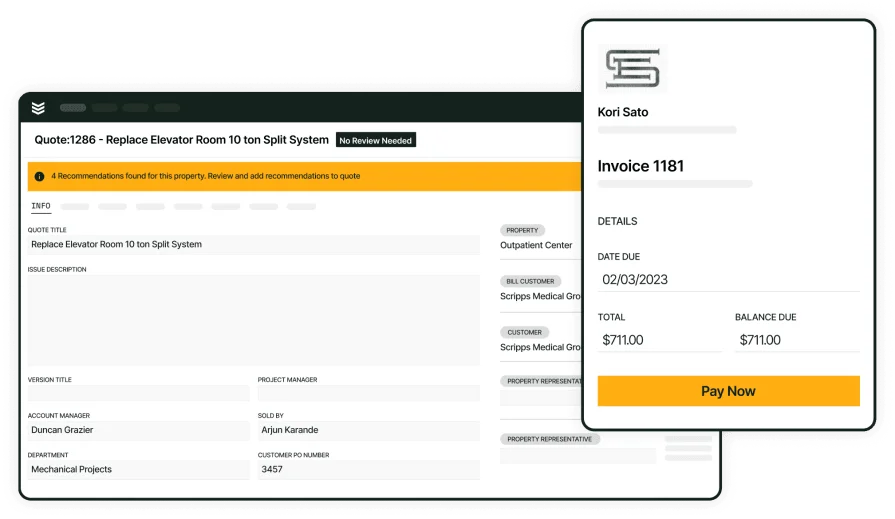
Land more projects
See how we help HVAC contractors prepare better bids and win more jobs.
2. Best for residential: PlanHub
Image Source: PlanHub
Residential jobs move fast—and so should your bidding process. PlanHub is designed for smaller-scale subcontractors and general contractors who need quick, organized access to bidding opportunities.
Key Features:
- Intuitive interface for finding residential HVAC jobs
- Easy collaboration with subcontractors and homeowners
- Centralized job management for faster, clearer bids
What Sets This Apart for Residential Bidding: With PlanHub, your residential customers can easily access job details, approve estimates, and track project progress through a centralized platform. This streamlined workflow helps you communicate faster, reduce back-and-forth, and close bids efficiently—so you can keep up in a fast-moving residential market.
3. Best for general contractors: ConstructConnect
Image Source: ConstructConnect
Working with general contractors requires seamless collaboration—and ConstructConnect gives you the tools to stay in sync and competitive. It’s trusted by contractors to manage bids across multi-trade projects.
Key Features:
- Cloud-based platform for tracking project timelines and costs
- Access to thousands of general contractor opportunities
- Real-time updates and collaboration tools for shared workflows
What Sets This Apart for General Contractors: ConstructConnect simplifies bidding for multi-trade projects by giving you access to thousands of opportunities, organized timelines, and real-time collaboration tools. With everything centralized in one platform, you can confidently manage bids, track project updates, and secure your role on large-scale, multi-phase jobs.
Expert Tip
These three options only scratch the surface of the many options out there that might be able to help you with your proposal, so check out our complete guide to HVAC bidding software to learn more about the tools, and help you choose one based on which would be best for your specific type of business.
Utilizing bidding sites & platforms to submit HVAC bids
Sifting through scattered job listings and managing multiple proposals can eat up valuable hours. Bidding platforms simplify the process by giving you a dedicated place to search for active projects, submit bids, and connect directly with companies looking for HVAC pros like you. These platforms are built to save you time, keep your proposals organized, and ensure you never miss out on a job that fits your business.
Here are some of the top websites where you can submit bids, connect with decision-makers, and turn opportunities into contracts:
1. PlanHub
PlanHub is perfect for subcontractors looking to connect with general contractors. It’s simple to use, packed with local opportunities, and helps smaller HVAC businesses grow their pipelines.
- Browse job opportunities tailored to your skills and location
- Collaborate directly with GCs to streamline the bidding process
- Manage bids and deadlines all in one place
What makes PlanHub stand out: PlanHub excels at connecting smaller HVAC businesses with local opportunities and GCs, making it perfect for growing businesses looking to win regional projects without getting lost in larger, competitive platforms.
2. ConstructConnect
ConstructConnect is the go-to platform for commercial contractors hunting for big, high-value jobs. It’s built for pros working on large-scale projects and multi-trade bids.
- Access a massive database of commercial and industrial projects
- Track projects, deadlines, and competition to stay ahead
- Collaborate seamlessly with GCs and project managers
Why commercial pros trust ConstructConnect: ConstructConnect is unmatched when it comes to targeting large-scale projects and managing multi-trade bids. It’s the go-to for HVAC contractors looking to compete on industrial and commercial builds without missing a beat.
3. BidPrime
BidPrime keeps you in the loop with real-time bid notifications. If staying updated and efficient is your thing, this platform is a lifesaver.
- Get instant alerts for HVAC opportunities in public and private sectors
- Search for projects that match your expertise and location
- Track bids with tools that make staying organized easy
How BidPrime gives you the edge: BidPrime ensures you’re first to the table with real-time notifications and instant bid alerts. It’s the platform for HVAC pros who want to stay ahead of the competition and never miss an opportunity.
4. Merx
Merx is the top platform for Canadian contractors looking for consistent public and private bid opportunities. It’s a must if you’re expanding into new markets.
- Browse HVAC jobs across government and private sectors
- Get ahead with tools to manage bids and deadlines
- Find high-value projects and recurring contract opportunities
Why Merx stands out: Merx specializes in providing a steady flow of public and private sector opportunities, making it ideal for HVAC businesses ready to expand into new regions or secure long-term contracts that keep their calendars full.
5. BidCentral
BidCentral is tailored for contractors who want to focus on local projects and collaborations. It’s straightforward, easy to navigate, and ideal for contractors working in regional markets.
- Find HVAC jobs in your area quickly and efficiently
- Access project details and connect with project owners directly
- Stay organized with tools to manage your bids and submissions
Why BidCentral is ideal for local projects: BidCentral simplifies the process of finding and bidding on regional projects. It’s the go-to tool for contractors focused on building strong local connections and winning jobs that are close to home.
BuildOps: your all-in-one solution for managing HVAC success
Winning bids is just the beginning. To deliver results and grow your business, you need tools that track progress in real-time, organize project schedules, and eliminate bottlenecks by identifying delays early and improving communication. That’s where BuildOps comes in.
From creating accurate proposals to scheduling jobs, tracking progress, and managing invoices, BuildOps offers a complete platform built specifically for commercial contractors. It’s everything you need to manage your business—all in one place.
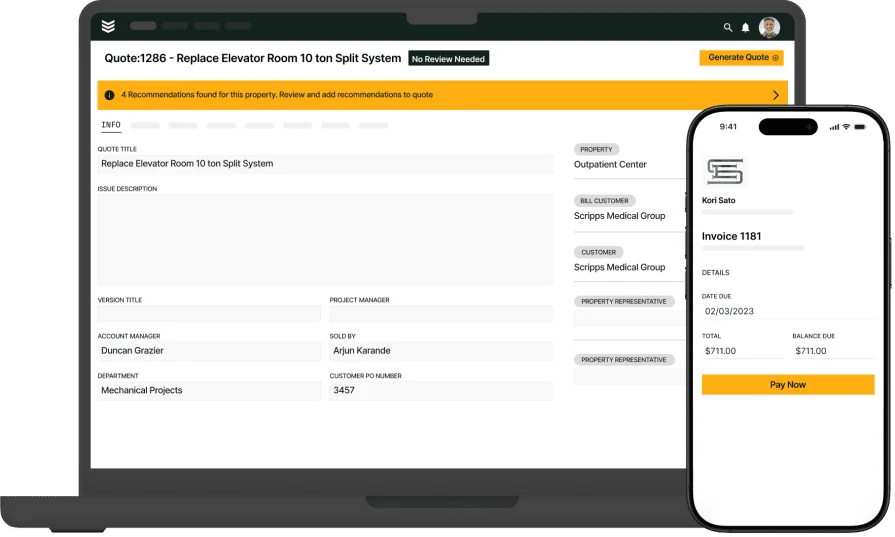
See BuildOps in action
See how we help teams win more bids and deliver projects on time.
